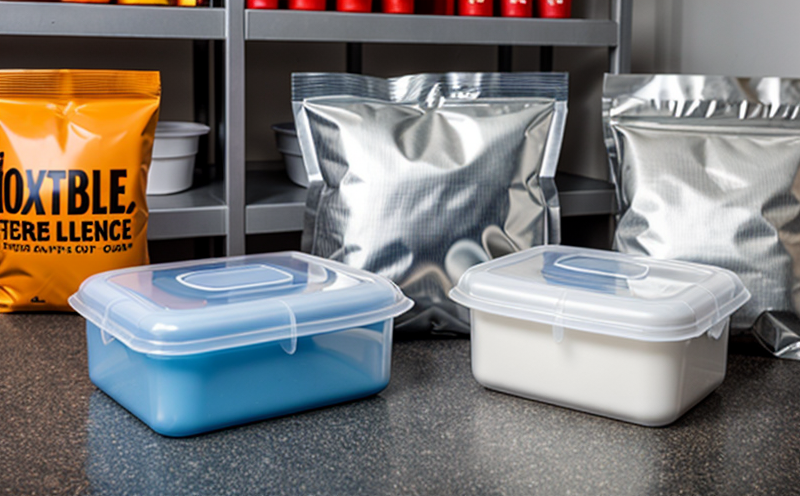ISO 7765-2 Puncture Resistance Test
The ISO 7765 series of standards provides methodologies for determining the puncture resistance properties of flexible packaging materials. Specifically, ISO 7765-2 focuses on the puncture resistance test of such materials under controlled conditions. This service is crucial for ensuring that packaging materials can withstand various environmental factors and mechanical stresses encountered during transportation and storage.
The test involves using a standard needle to puncture the sample material, measuring the force required to penetrate through it. The result provides valuable insights into the integrity and durability of the packaging material. Understanding these properties is essential for quality managers, compliance officers, R&D engineers, and procurement teams who need to ensure that their products meet international standards.
The testing process typically begins with careful preparation of the sample. This includes ensuring that the specimen is free from defects or variations in thickness, as such inconsistencies can skew results. After preparation, the specimen is placed on a mounting device designed specifically for this test. The mounting ensures that the sample is held securely and accurately during the puncture.
The testing machine used for ISO 7765-2 is calibrated according to international standards to ensure accurate measurement of force applied during penetration. The machine applies increasing pressure until it successfully penetrates the material, recording both the maximum force required (in Newtons) and the depth at which penetration occurs. This data is then analyzed to determine compliance with specified puncture resistance requirements.
The importance of this test extends beyond mere quality assurance; it plays a critical role in maintaining food safety, preventing product contamination, and ensuring consumer satisfaction. By adhering to these tests, manufacturers can demonstrate their commitment to producing safe, reliable products that meet the highest standards of international regulations.
Environmental factors such as temperature changes, humidity levels, and physical impacts during handling all contribute to the overall stress on packaging materials. Understanding how well your product's packaging will perform under these conditions helps in making informed decisions about material selection and design optimization. Regularly performing tests like ISO 7765-2 allows companies to identify potential weaknesses early on, thus preventing costly recalls and reputation damage.
Compliance with international standards like ISO 7765-2 is not only beneficial for maintaining a competitive edge but also essential for meeting regulatory requirements across different regions. Many countries require that packaging materials undergo rigorous testing before being approved for use in food or pharmaceutical industries, among others. Ensuring compliance ensures seamless market entry and avoids costly delays due to non-compliance.
Moreover, the puncture resistance test helps in reducing waste by optimizing material usage. By accurately determining the necessary thickness required based on puncture resistance tests, manufacturers can minimize excess packaging while still maintaining structural integrity. This approach contributes significantly towards sustainable practices within the industry.
Eurolab Advantages
At Eurolab, we pride ourselves on delivering comprehensive and reliable testing services tailored to meet your specific needs in flexible packaging materials evaluation. Our state-of-the-art laboratory facilities are equipped with advanced instruments capable of performing ISO 7765-2 puncture resistance tests accurately and consistently.
- Accurate Calibration: All our machines are regularly calibrated according to international standards, ensuring precise measurements during every test.
- Expertise in Interpretation: Our team of experienced engineers interprets results accurately, providing actionable insights that can guide improvements in your product design and manufacturing processes.
- Comprehensive Reporting: We offer detailed reports outlining all aspects of the testing process, including raw data, calculated values, graphical representations, and recommendations for improvement where necessary.
Choosing Eurolab means accessing unparalleled expertise combined with cutting-edge technology. Our services are designed to help you stay ahead in today's competitive market by providing robust evidence of your product's quality and reliability.
Environmental and Sustainability Contributions
- Reduction in Waste: By accurately determining the necessary material thickness needed for optimal puncture resistance, we help minimize waste without compromising on structural integrity. This approach supports sustainable practices within the industry.
- Innovation in Design: Understanding how packaging materials behave under various conditions allows us to contribute towards innovation in design that enhances both functionality and sustainability.
The puncture resistance test plays a vital role in promoting environmental responsibility by encouraging manufacturers to adopt eco-friendly practices. By ensuring that packaging meets stringent quality standards, we also promote responsible consumption, reducing unnecessary resource depletion associated with suboptimal designs or excessive material usage.
Additionally, compliance with international standards like ISO 7765-2 helps pave the way for more sustainable supply chains. When companies adhere to these rigorous testing protocols, it fosters trust among consumers who increasingly seek out environmentally friendly products and services.
Use Cases and Application Examples
- Food & Beverage Packaging: Ensuring that containers for perishable goods like milk or juice have sufficient puncture resistance prevents leakage during transit, maintaining product freshness and quality.
- Pharmaceutical Industry: In this highly regulated sector, ensuring the integrity of blister packs is crucial to prevent contamination and ensure patient safety. Puncture resistance tests help verify that these critical components meet strict hygiene standards.
- Cosmetics & Personal Care Products: For items containing liquids or creams, packaging must be robust enough to resist accidental puncture during storage or use. This ensures product integrity and extends shelf life.
Besides protecting contents from physical damage, puncture resistance testing also contributes significantly to enhancing brand reputation. Consumers trust brands that demonstrate a commitment to quality control through stringent testing procedures, leading to increased customer loyalty and satisfaction.
The ability of packaging to withstand punctures is just one aspect of overall package integrity. When combined with other tests such as seal strength or drop impact resistance, this service provides a holistic view of your product's performance under realistic conditions encountered during its lifecycle.





